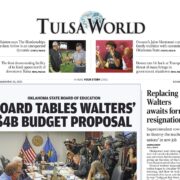
If you were a state shopping for districts to take over, the pandemic provided a golden opportunity by putting more schools on the naughty list.”
Peter Greene, high school English teacher and senior contributor for Forbes magazine
Oklahoma educators, staff and administrators have shared an unsettling journey throughout the past two years, managing to carefully navigate the faintly painted boundaries of H.B. 1775, surviving threats of violence from parents, being cast as members of a terrorist organization, public exposure of their home addresses by ‘concerned citizens’, downgrades of accreditation, audit revelations and now, the potential takeover of the Tulsa Public School district by the state.
The latter, a broadly GOP-supported action being considered by Oklahoma Superintendent of Public Instruction, Ryan Walters, looms above the Tulsa School District.
The parking lot of Charles C. Mason Education Service Center, 3027 S. New Haven Ave. Tulsa, OK, gradually begins to fill at 6:00 p.m. Several SUVs occupy spaces rows behind smaller vehicles. Parents can be seen quickly finishing a fast-food meal or snack before their brief walk across the parking lot. Others, guiding their children through the complexities of homework, as the late evening school board meeting would not afford them enough time to complete assignments before bedtime.
By 6:15 p.m., more parents and Tulsa residents arrive, repeating the same effort with greater haste.
Within the span of the two minutes until the start of the meeting scheduled at 6:30 pm, these Tulsans exit their vehicles, quickly gather their children’s books, phones and digital media devices, then approach the rear entrance of ESC. Seldom is a return trip necessary, mid-walk, as the district’s residents are more than prepared to advocate for the success and well-being of their children.
Printed copies of the posted agenda and other reference materials are nested within binders carried in totes, branded with local company logos.
Those now arriving and searching for any remaining parking are reminded of the soon-approaching half-hour mark, yielding to the small groups completing their walk towards the ESC.
The TPS school board hosts ‘Regular Meetings’ every first and third Monday of the month during their annual session. A ground floor space, the Cheryl Selman Room, opens to two rows of seating from the rear, and school board member/staff seating on the right. Centered along the far wall of the room is a lectern for Tulsans who have registered to speak during the public comments segment of the meeting.
By the time the meeting starts, both longtime residents and those who have recently moved to the district occupy the room. All share a desire to demand and effect outcomes from local administrators that Tulsa’s children deserve.
TPS board members, local administrators, are accountable to Tulsans gathered during the Monday evening meetings, as well as those whose are absent. Such local and directly elected representation is key to ensuring that Tulsans’ voices are heard, and that no barrier is erected to shield bureaucrats from criticism and accountability.
The specter of a state takeover of TPS gives rise to the perceived risk of losing local representation in exchange for the weighted hand of state government, and exposure to the politically-charged whims of a state governing administration that is objectively crossed with most Tulsans.
School district takeovers by state agencies, surprisingly, are not uncommon. Since the late 1980s more than 114 state governments have exercised their statutory authority to transfer decision-making power from locally elected school boards to the state.
The impacts of such a forced shift in local representation, and school performance, thereafter, do not consistently reveal a clear set of facts that support such decisions that are far too often motivated by political agendas.
The state’s leading official, Walters, has offered Oklahomans precious few insights regarding a possible TPS takeover throughout the last few months.
A punitive degrading of accreditation, quips against Dr. Deborah A. Gist, TPS’s School Board Superintendent, unprecedented rhetoric against Oklahoma Education Association (OEA) and general critiques of school performance are objectively the extent to which Walters has represented his brand of leadership.
Absent from his discussions are the facts surrounding the potential school district takeover, anticipated and past results from similar experiences nationally and any attempt to address the concerns of Tulsans.
Context
The results-based outcomes in education have been an evolving focus of parents, educators and governing officials nationally for more than five decades. The country’s most vigorous effort to achieve equitable outcomes dates back to the mid 1960s, under the Lyndon B. Johnson U.S. Presidential administration.
Nine months following the passage and signing of the Civil Rights Acts of 1964, Johnson’s sweeping reform of federal education policy was reflected in a significant leap forward, the Elementary and Secondary Education Act (1965). Emphasizing equal access to education, and closing achievement gaps, the act provided federal funding to primary and secondary education, with funds authorized for professional development, instructional materials, resources to support educational programs, and parental involvement promotion.
Oklahoma’s Black children of the era, of no greater or lesser value than today, whose parents shared the same desire for equality and the opportunity to achieve the ‘American Dream’, continued to challenge the state’s resistance to integrated schools and the Brown v. Board of Education (1954) ruling.
Following decades of legal challenges by community and civil rights leaders in Oklahoma, such as Clara Luper and James O. Goodwin, esquire (Publisher, The Oklahoma Eagle), Oklahoma school districts and local governing authorities reluctantly integrated schools and dismantled taxing models to support the legacy ‘separate schools’ model.
Since 1965, ESEA has been modified and reauthorized by the U.S. Congress several times, to address specific considerations of bilingual education (Bilingual Education Act) and discrimination against students and educators (Equal Educational Opportunities Act of 1974).
Concerns regarding America’s ability to compete globally gave rise to calls for additional education reforms and accountability. A Nation at Risk: The Imperative for Educational Reform (1983), a U.S. President Ronald Reagan era report that emphasized potential risks to economic security should the country not address education shortfalls, compelled U.S. legislators to further revise the ESEA. National standards-based education, reforms with a core focus on measuring K-12 student’s proficiency in specific disciplines, became the source for what is now believed to be an objective tool for parents and administrators to determine a school’s performance.
The No Child Left Behind Act of 2001 (NCLB) served as the foundation upon which standards-based education would evolve, with a key emphasis on provisions applicable to disadvantaged students. NCLB faced myriad criticisms throughout the 13 years of its application, primarily the lack of federal funding invested to realize the legislators’ goals and a state’s ability to secure waivers from various requirements.
Other federal education standards initiatives, such as Common Core, have been met by the state GOP’s populist conservatives, who herald the virtues of individualism and accountability, but quietly gave way to funding that the state so desperately requires.
Today, the Every Student Succeeds Act (ESSA) serves as the federal law that governs K-12 education. According to OKPolicy.org, “ESSA largely rolls back the authority of the federal government in education policy. It prohibits the federal government from requiring any specific academic standards or intervention methods. The Act also removes the “highly qualified teacher” provision, and prohibits the federal government from requiring states to have a teacher evaluation system.”
The perceived ‘NCLB light’ standard was embraced by Walter’s predecessor, former State Superintendent of Public Instruction Joy Hofmeister. She noted that “states will now be able to determine the most appropriate, research-based plan to address school improvement and student support for Oklahoma students…This is different from the old ‘one-size-fits-all’ approach of No Child Left Behind.”
Takeovers
State school districts seldom engage residents in a manner to ensure that they are fully informed about the potential consequences of school takeovers. Instead, legislators and state agency officials, similar to Oklahoma, rely upon heated rhetoric and personal attacks to compel residents to support their positions.
The Oklahoma State Board of Education’s website homepage, as of this publishing date, reveals no mention of a potential takeover or the scope of what the state is considering.
Walters, in no productive service to Oklahomans, has only offered broad and seemingly empty proclamations. During the Jul. 27 monthly OSBE meeting he noted that “We are looking at all possible actions with this district to ensure that all state laws or rules are being upheld by that district in a way that benefits those kids,” NonDoc reported.
In ‘State Takeovers: No Silver Bullet for School District Improvement,’ Dr. Beth Schueler, an assistant professor of education & public policy at the University of Virginia, builds upon the work of Kenneth Wong and Francis Shen who examined the impact of school district takeovers prior to NCLB. Schueler’s work, informed by applied federal accountability standards, tracked all 114 state takeovers that had occurred since the earliest cases in the late 1980s through 2016.
Most states have experienced some measure of state school board takeovers. Throughout all regions of the country, 23 states have wrested authority from local school boards.
Lower academic performance is a common metric related to takeovers, however, this point of concern is of lessor significance for school district takeovers that serve a greater share of Black students. Schueler found that state intervention of majority white school districts was compelled by academic performance, while majority Black school district takeovers where not predicated on similar performance standards.
Drawing a direct comparison of test scores was possible by focusing on a subset of the 114 state takeovers. Schueler identified a group of 35 takeovers that occurred between 2011 and 2016 nationally, concluding that overall, no evidence existed that state takeovers improved academic achievement.
The states’ approach to takeover, highlighted in the report, is varied. In the case of the New Orleans, La. public school system takeover by Orleans Parish-Recovery School District (RSD), by all objective measures schools were failing. Douglas Harris of Tulane University and Matthew Larsen of Lafayette College, perhaps the most high-profile researchers that have documented the RSD takeover, New Orleans “was the second-worst performing district in one of the worst-performing states.”
Louisiana’s National Assessment of Educational Progress (NAEP) score during the early part of century was regarded as the worst in the nation, with the state earning a last place ranking in 4th and 8th grade math, and ranking near the bottom in reading at both grade levels ranking.
In Lawrence, Mass., 2011, the state takeover of public schools was not affected with an approach similar to RSD. Jeffrey Riley, the state selected school district receiver, employed a greater focus on raising and meeting expectations. The former teacher and administrator, Riley, opted not to advance the heavier handed conversion of public schools to charter institutions, but instead relied upon a hybrid model that established a balance between centralized and decentralized authority. Further, Riley championed initiatives that increased learning time; established a merit-based compensation model; and leveraged data-driven instructional improvements.
The results in both cases, New Orleans and Lawrence, were objectively positive, with the former achieving “dramatic improvements.” The latter, Lawrence, showed significant gains in math and modest improvement in English scores. Graduation rates in Lawrence increased 19 points by 2016, and another seven points by 2022.
What many school districts have realized throughout the decades is that there exists no single approach to takeovers that best produces desired results.
Nationally, the positive impact of district takeovers is selectively lifted by state officials to justify the intent. However, Schueler’s effort revealed “no positive learning impacts of takeover on average,” and documented “substantial” variation in the effect of takeover.
Variations of the positive and negative impacts of takeovers are most apparent when considering the relative academic performance of the target school compared to schools nationally, according to Schueler. Plainly stated, takeover districts may be the lowest performing schools within their state, but not in the country. It is within this paradigm, according to the report, that negative impacts are concentrated.
Of perhaps greater significance, Schueler noted that “takeover is least harmful in districts serving large concentrations of Hispanic students, suggesting that takeover has been riskier when implemented in majority-Black contexts.”
Although not a clearly established predictor of success, the well-regarded research seems to suggest that state officials should view the performance of their state school districts through a broader lens, considering corrective measures that protect local autonomy, and employ remedies that both require and aid improvement.
Millard House II, the former Houston Independent School District (HISD) Superintendent, acutely observed and fairly chronicled the actions of the Texas legislature who successfully litigated the state’s authority to take over the school district in 2023, after a years-long legal battle. “This takeover is not about the quality of education. If you look at the Texas Legislature, several bills have been filed to pre-empt the authority of the city of Houston and other local jurisdictions. HISD happens to be one of those local jurisdictions,” House said.
Houston’s public school district was felled by the populous whim of conservatism. A political ideology, when fully observed, justifies the exercise of power to effect the sentiment of patriotism amongst students, as opposed to providing objective and comprehensive study that empowers youth to assess and determine the vice and virtue of historic events and figures.
Western Heights School District in Oklahoma City, Okla., was the state’s most recent school district to lose its authority of local governance. In April 2021, the Oklahoma State Board of Education placed Western Heights on probation, after years of complaints registered by parents, significant concerns regarding financial management, failure to provide in-person instructional services to students and a failure to provide food services to students. The district’s graduation rates were among the lowest in the state, according to the audit, while absenteeism was among the highest.
After being placed on probation by OSBE in Apr. 2021, the unanimous decision to suspend the district’s superintendent, Mannix Barnes in Jul. 2021, the implementation of a state-led intervention plan and a months-long legal challenge in county and the Oklahoma Supreme Court, the Western Heights School District & OSBE would commit its focus to resolving immediate challenges identified by auditors.
The state’s decision to shift governing authority away from local representatives was embraced by then-Superintendent of Public Instruction Joy Hofmeister, who shared, “Things are going to change at Western Heights.”
Following a year of varied intervention methods, Interim Superintendent Brayden Savage reported, during an OSBE quarterly meeting in May 2022, that some progress had been realized but that the district’s challenges are “more diverse and widespread.”
An assessment of success, or failure, of the state takeover at this juncture is perhaps premature, given the scope and depth of issues faced. It is worth noting, however, that the intervention approach employed is objectively less heavy-handed than that of Orleans Parish-Recovery School District.
Savage’s engagement with the Western Heights community was centered within “building trust through open communication with the district’s stakeholders.”
Brianna Dodd, a 2011 Western Heights graduate, parent and community organizer, was initially skeptical of Savage, according to reporting by The Oklahoman. Dodd, who attended a community forum led by Savage in Jan. 2022, shared that “I feel that she listened and heard everything that I said, and for the first time in four years, I’ve found peace with the situation.”
Walters’ engagement with Tulsans, as reported by The Oklahoma Eagle on Aug. 8, stands in sharp contrast to both Western Height’s Savage and Lawrence, Mass. officials.
An early August press conference in Tulsa was hastily announced by Walters, just hours before it started. Followed by threats of exclusion or loss of access if the media advisory was shared by outlets, the live-streamed event was yet another chorus of attacks against the TPS board and the introduction of an “Improvement Plan” that would require substantial student reading score improvements by the end of the upcoming academic year.
Representation Matters
State takeover consistently results in the removal of local leadership, specifically the district superintendent and often board members.
Tulsa’s 78 unique learning communities, serving more than 33,000 students, are represented by seven board members, each elected by their respective district residents.
TPS board members are not simply elected officials, representatives who’ve gained more than modest popularity within their respective communities and successfully earned a majority share of several hundred votes. Familial ties, of four or more generations at least, give form to a relationship that may only be characterized as “of Tulsa.”
Winning by a margin of 26 votes, out of 1,028 cast, Dr. Jennettie Marshall earned a second term to represent TPS district 3 in Apr. 2021. Dr. Marshall retired from the State of Oklahoma where she worked for the Department of Corrections and the Department of Human Services. The second-term board member also served the City of Tulsa as a police and fire chaplain and was trained in emergency disaster response and hostage negotiation. Being “of Tulsa”, Dr. Marshall shares the interests of her constituents, just like her colleagues.
TPS Superintendent Gist has drawn the apparent ire of Walters, evidenced by his publicly stated desire for her removal. The attacks against Gist and TPS teachers continue to be met by opposition from educators, community organizations, philanthropies and the state’s native tribes, reflected in reporting by The Oklahoma Eagle earlier this week.
“This is nothing more than a witch hunt,” said Shawna Mott-Wright, president of the Tulsa Classroom Teachers Association, during an interview with FOX23, after Walters’ recent press conference on Aug. 7.
Mott-Wright, like many Tulsans, regard Walters’ rhetoric as an attempt to undermine the stability of TPS. In response to learning about Walters’ consultation with Texas Education Commissioner Mike Morath, and discussions about strategies Texas used in its takeover of HISD, she shared, “That’s the plan right… when you’re on a witch hunt and you’re coming after our district, then you make us to where we can’t function how we want to, and then blame us for it.”
Should Walters follow the HISD takeover approach, TPS board representation may be significantly altered. Morath officially announced on Jun. 1 that he has removed Houston ISD’s elected school board and superintendent from power. Governance of the state’s largest school district now rest with an appointed, not elected, team and a new district leader, Mike Miles, former Dallas Independent School District chief.
HISD’s new school board composition includes several Houston ISD parents, business professionals and one former school teacher. Although the board’s composition reflects the racial and ethnic diversity of the school district, seven of the nine appointed members live in Houston’s more-affluent neighborhoods west of downtown.
The shift from representation “of” school district communities in favor of more affluent board members that don’t reside within communities that would likely be most impacted by quickly evolving policies, gives rise to concerns of Tulsa parents.
Why Motive Or Intent Is Irrelevant
It is far too convenient, and perhaps the intended objective of city and state officials who appear to thrive in a climate of manufactured distrust, to immediately speculate about the motives of the red state’s politicians. Such distrust, often the product of hate-filled political rhetoric and the fear it inspires, compels Oklahomans on both sides of the issue to support a course of action that either aligns with public figures viewed favorably, or stand against those who ‘hate them’.
Any discussion anchored by motive and intent encourages Oklahoma parents, teachers and staff to quickly move towards their respective corners… And away from the broad and potentially significant impact of the state’s decision to takeover Tulsa Public Schools.
Walters, representing Oklahoma Governor Kevin Stitt’s administration regarding public school education, related governance and vision, has well-established himself as a vocal critic of the OEA, Tulsa School Board Superintendent Gist and any effort to cast the history of slavery within the U.S. as being an integral aspect of the country’s founding, its institutions and DNA.
As a candidate for state Superintendent of Public Instruction in late 2022, Walters introduced a desired mandate for “Patriotic Training”, representing the political ideologically conservative Hillsdale College’s program as a tool for ensuring that the state’s educators “know our history”.
State legislators have also advanced bills (House Bill 1775, 2021) that have placed state educators upon a thin wire where they must balance their moral obligations to provide students with an objective and comprehensive history, and now statutory limitations.
The motives and intent of state officials, in the current political environment, are seldom cloaked, disguised or hidden. Walters, as is the case with Oklahoma state legislators, has advocated for nationalist-inspired remedies to real problems, all of which mandate fealty at the expense of personal liberty and the education of children.
Should Oklahoma officials ‘make good’ on their threats of further punitive action against TPS, and takeover the state’s largest school district in pursuit of its perceived Brave New World, Tulsa students and parents will ultimately shoulder the weight of such partisan bias.









